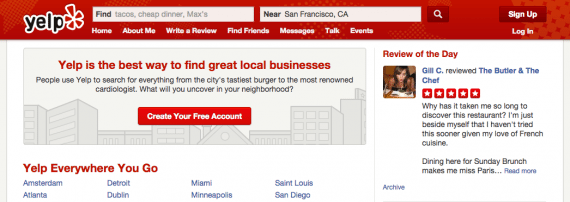
Yelp is a leading consumer-focused reviews site.
Yelp.com is no stranger to lawsuits involving libel, defamation, and privacy laws. As Yelp is one of the largest rating sites, a body of case law has started to form around actions that have taken place on the site by users, and how to handle negative reviews online.
Note that “case law” is the legal concept that as courts make decisions, the decisions can be looked to for citing in future cases as precedent as to how courts should interpret laws. The higher the court, the more weight is given to the decision in a specific case.
For example, if a small claims court makes a decision, little, if any, weight is given to the outcome in the case and lawyers do not cite the case as precedent as to why a court should decide a case being currently heard in a specific way. However, if the U.S. Supreme Court has ruled on a similar case in the past, a lawyer would cite the ruling as case law in a current case arguing that the court hearing the case needed to apply the law the way the Supreme Court had ruled in a previous case.
Yelp Reviews Affect Revenue
So why is Yelp so frequently an underlying player of a lawsuit? According to a study published in 2011 by Harvard Business School, a one star increase in a Yelp rating can increase a business’s revenue by 5-9 percent. By 2011, Yelp already had 20 million reviews. According to Yelp, there were over 71 million reviews by the fourth quarter of 2014. Reviews on Yelp matter.
It is important to note, while the subject of this article is Yelp, multiple other sites have been involved in lawsuits as well. For example, TripAdvisor has experienced controversies, including bribery, hotels fining guests for bad reviews, and defamation claims. Angie’s List has had claims of manipulating reviews. Google AdWords has been the subject of cases involving trademark infringement claims. No review site, in other words, is immune from being a player in a lawsuit.
Court Decisions Involving Negative Reviews
Many business owners have attempted to use the court system to remove negative Yelp reviews. Here are some of the cases.
- Dietz vs. Perez. Perez used a contractor (Dietz) in Virginia to provide construction services at her house. After dissatisfaction with Dietz’s work, Perez posted a review on Yelp regarding the services. The review stated that the work was substandard and that jewelry was taken from her house. Dietz sued Perez saying the reviews were defamatory and cost his business significant sums. The court determined that both sides had defamed each other and awarded no damages to either side.
- Lee vs. Makhnevich. Lee went to see Dr. Makhnevich in New York for dental work. Lee signed an agreement that Makhnevich owned the copyright on any reviews that Lee placed online about the dentist or her business. Typically, a business has a hard time getting a review removed by a review site due to protections afforded public websites. However, copyright claims are taken fairly seriously by review sites.
Due to this, Makhnevich was more easily able to have “copyrighted” materials removed from review sites than claiming defamation or libel. After receiving notice that Makhnevich intended to bring a copyright infringement claim against Lee for a review on Yelp, Lee sued Makhnevich to void the assignment of copyright. In a decision this February, the U. S. District Court for the District of South New York decided that the contract signed by Lee was against public policy, without consideration, and against New York law and voided the contract.
- Wong v. Ling. Tai Jing and Jia Ma took their child to see Dr. Wong (also a dentist, like Dr. Makhnevich) and believed that he received substandard care. They wrote a negative review of Dr. Wong on Yelp’s website and were served with a court case shortly thereafter, alleging libel for the review and resulting emotional distress by Dr. Wong. The court dismissed the claims of emotional distress, and awarded Jing and Ma attorney fees under California’s Anti-SLAPP statute, which protects certain free speech such as the review against the dentist in this case.
How to Deal with Bad Reviews?
When advising business owners and reviewers how to deal with review sites, I rarely take the approach that the courts should be involved. As can be seen in the cases listed above, lawsuits rarely result in a ruling that helps a business. Even if a ruling is reached where the business is right, the case can result in a public relations nightmare and still result in loss of customers. If a business will sue one customer, it is usually an indication that it will sue you too.
This is not to say that the legal system should never be used. For example, if a former employee or spouse is the one writing the negative review, then the courts may be the most appropriate way to handle the situation. If physical threats are involved by either party, the court system probably is necessary. However, each situation is unique and should be evaluated on a case-by-case basis.
So, how should a business approach bad reviews? While a business may have legal grounds to sue, it is usually better to fight the bad reviews on a marketing rather than legal level. Responding to all bad reviews publicly on the review site can help the business appear to the public to be responsive.
The business, if at all possible, should contact the negative reviewer and ask how to fix the situation. After the situation is remedied, a polite request to remove the review may be granted. If removal of the review isn’t available, if the situation has been fixed, the negative reviewer may be willing to write a new, more positive, review. By being proactive and professional, a business can help ensure that it isn’t the name listed in case law used in future cases!




